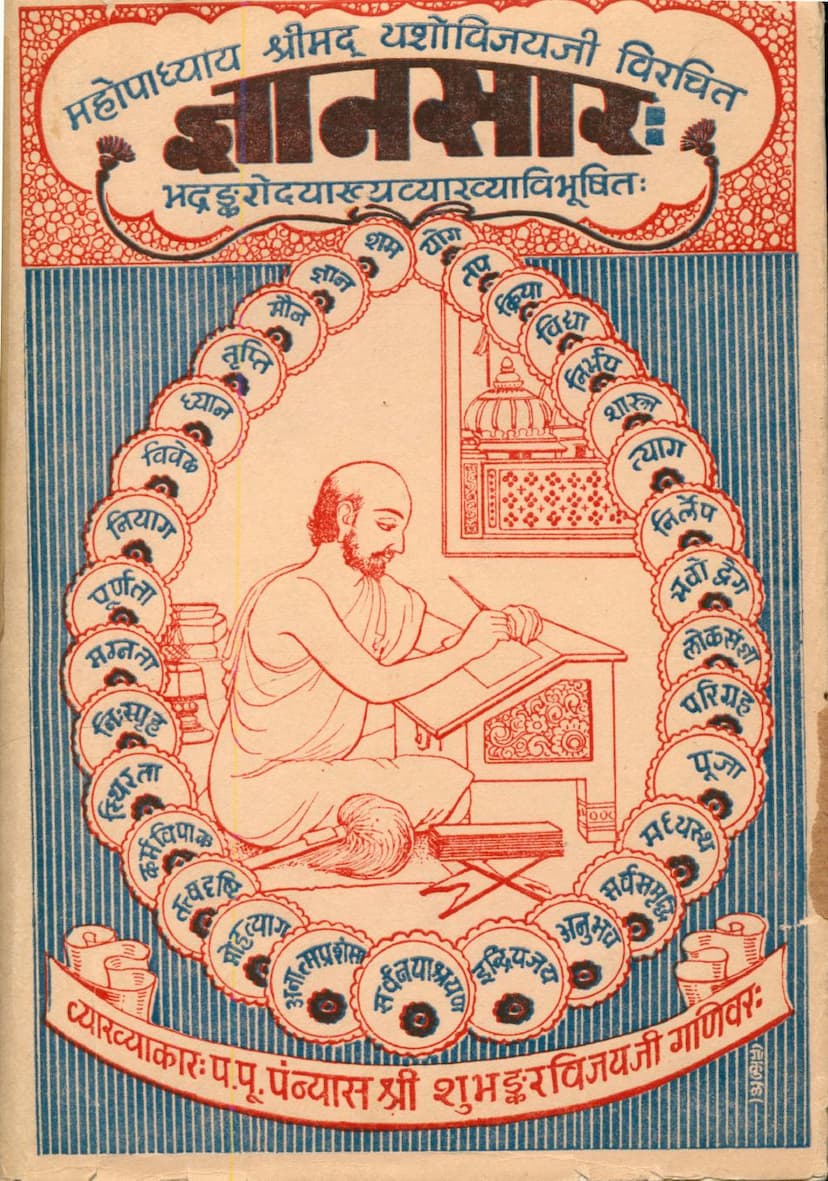Gyansara
Added to library: September 1, 2025

Summary
This Jain text, titled Gyansara (ज्ञानसार), is a commentary on a work by Acharya Yashovijayaji Upadhyay (आचार्य यशोविजयजी उपाध्याय) titled Gyansara (ज्ञानसार), which itself is a treatise on Jain philosophy and spiritual practice. The commentary is authored by Shubhankarvijay Ganivar (शुभङ्करविजयजी गणिवर), a disciple of the esteemed Acharya Yashobhadra Surishwarji (आचार्य यशोभद्र सूरिश्वरजी). The commentary itself is named Bhadrakarodaya (भद्रकरोदया), meaning "the rising of auspiciousness."
The book is published by Shri Jain Shwetambar Murtipujak Sangh, Madras (श्री जैन श्वेतांबर मूर्तिपूजक संघ, मद्रास).
Key aspects and content of the text:
-
Authoritative Lineage: The text emphasizes a strong spiritual lineage, tracing the commentary back through several prominent Acharyas: Acharya Shri Vijay Nemisurishwarji, Acharya Shri Vijay Vigyan Surishwarji, Acharya Shri Vijay Kastursurishwarji, Acharya Shri Yashobhadra Surishwarji, and finally to the author Shubhankarvijay Ganivar. This highlights the importance of received wisdom and proper transmission of knowledge in Jain tradition.
-
Purpose of the Commentary: The commentary aims to illuminate the profound teachings of the original Gyansara, making its spiritual and philosophical concepts accessible to a wider audience. The author, Shubhankarvijay Ganivar, was inspired to undertake this extensive commentary during a Chaturmas (a four-month retreat during the monsoon) in Madras, at the request of the local Jain community.
-
Content of Gyansara: The Gyansara, as explained by the commentary, is a comprehensive spiritual guide. The text is structured into "Ashtakas" (अष्टक), which are sets of eight verses or sections, each focusing on a specific spiritual or philosophical concept. The summarized table of contents from the provided images reveals the breadth of topics covered:
- Purnashtaka (पूर्णाष्टक): Likely dealing with the concept of completeness or perfection.
- Magnashtaka (मग्नाऽष्टक): Possibly about immersion or absorption in spiritual practice.
- Sthirataashtaka (स्थिरताऽष्टक): Focusing on steadfastness or stability in spiritual pursuit.
- Mohatyagashtaka (मोहत्यागाऽष्टक): Dealing with the abandonment of delusion or attachment.
- Gyanashtaka (ज्ञानाऽष्टक): Centered on the nature and importance of knowledge.
- Shamashtaka (शमाऽष्टक): Pertaining to tranquility or equanimity.
- Indriyajayashtaka (इन्द्रियजयाऽष्टक): On the conquest of the senses.
- Tyagashtaka (त्यागाऽष्टक): About renunciation.
- Kriyashtaka (क्रियाऽष्टक): Focusing on action or practice.
- Triptyashtaka (तृप्त्यष्टक): On contentment or satisfaction.
- Maunaashtaka (मौनाऽष्टक): Pertaining to silence or restraint of speech.
- Vidyashtaka (विद्याऽष्टक): About knowledge or wisdom.
- Vivekashtaka (विवेकाऽष्टक): Focusing on discernment or discrimination.
- Madhyasthaashtaka (मध्यस्थाऽष्टक): Dealing with impartiality or neutrality.
- Nirbhayashtaka (निर्भयाऽष्टक): On fearlessness.
- Anatmashamsashtaka (अनात्मप्रशंसाऽष्टक): Likely about non-attachment or the praise of the non-self.
- Tattvadrishtyashtaka (तत्त्वदृष्ट्यष्टक): Pertaining to the vision of reality.
- Sarvasamriddhyashtaka (सर्वसमृद्ध्यष्टक): About all-encompassing prosperity (likely spiritual).
- Karmavipaka Chintanashtaka (कर्मविपाकचिन्तनाऽष्टक): On reflection on the results of karma.
- Bhavodvegaashtaka (भवोद्वेगाऽष्टक): Pertaining to detachment from the cycle of existence.
- Lokasanjnaatyagaashtaka (लोकसंज्ञात्यागाऽष्टक): On the abandonment of worldly conventions or recognition.
- Shastradrishtyashtaka (शास्त्रदृष्टयष्टक): Focusing on the vision or understanding derived from scriptures.
- Parigrahashtaka (परिग्रहाऽष्टक): About possession or attachment.
- Anubhavashtaka (अनुभवाऽष्टक): On experience, likely spiritual realization.
- Yogashtaka (योगाऽष्टक): Pertaining to yoga or spiritual discipline.
- Niyagaashtaka (नियागाऽष्टक): Possibly about prescribed duties or practices.
- Pujashtaka (पूजाऽष्टक): On worship or devotion.
- Dhyanashtaka (ध्यानाऽष्टक): About meditation.
- Tapasashtaka (तपोऽष्टक): Pertaining to asceticism or austerity.
- Sarvanayaashrayanashtaka (सर्वनयाश्रयणाऽष्टक): On the adoption of all viewpoints or perspectives.
- Upasanhara (उपसंहार): Conclusion.
-
Commentary Style: The commentary, Bhadrakarodaya, meticulously explains each verse of the Gyansara. The presence of a detailed "Shuddhipatraka" (शुद्धिपत्रक) or errata list indicates the care taken in the publication and a commitment to accuracy.
-
Publisher and Value: The book is a publication of the Shri Jain Shwetambar Murtipujak Sangh (Madras), and its original price was 3 rupees and 75 paise. The publication details mention various places where the book was available, including Godhra and Ahmedabad.
In essence, "Gyansara" by Acharya Yashovijayaji, with the commentary "Bhadrakarodaya" by Shubhankarvijay Ganivar, is a significant Jain text that delves into fundamental aspects of spiritual life, covering knowledge, practice, detachment, and the ultimate realization of the soul's true nature, all within the rich framework of Jain philosophy.